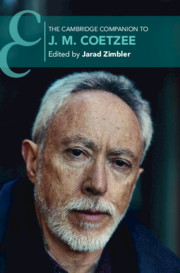Book contents
- The Cambridge Companion to J. M. Coetzee
- The Cambridge Companion to J. M. Coetzee
- Copyright page
- Contents
- Contributors
- Acknowledgements
- Chronology
- Abbreviations
- Introduction
- Part I Forms
- Part II Relations
- Part III Mediations
- 11 Other Arts and Adaptations
- 12 Philosophies
- 13 Lives and Archives
- 14 Publics and Personas
- Further Reading
- Index
- Series page
12 - Philosophies
from Part III - Mediations
Published online by Cambridge University Press: 26 April 2020
- The Cambridge Companion to J. M. Coetzee
- The Cambridge Companion to J. M. Coetzee
- Copyright page
- Contents
- Contributors
- Acknowledgements
- Chronology
- Abbreviations
- Introduction
- Part I Forms
- Part II Relations
- Part III Mediations
- 11 Other Arts and Adaptations
- 12 Philosophies
- 13 Lives and Archives
- 14 Publics and Personas
- Further Reading
- Index
- Series page
Summary
This chapter concerns Coetzee’s encounter with philosophers and philosophy. After a brief description of Coetzee’s formation and institutional affiliations, it turns its focus to the ways in which Coetzee has probed both the capacity of literary works to confront philosophical questions and the innate capacities and limitations of philosophy’s own embedded disciplinary procedures and approved forms of discourse. It argues that Coetzee has done this by developing provocations: elaborating propositions – about the nature of human language, consciousness, and being; about the nature of truth, knowledge, and existence – that entice and frustrate philosophical readers, asking that they at least consider what their discipline takes for granted or leaves out of account in its framing of these issues.
- Type
- Chapter
- Information
- The Cambridge Companion to J. M. Coetzee , pp. 206 - 220Publisher: Cambridge University PressPrint publication year: 2020
- 1
- Cited by

